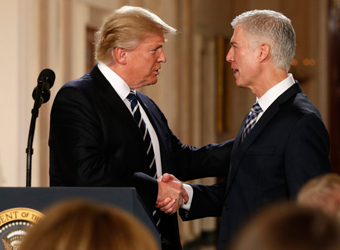U.S. President Donald Trump has nominated Federal Judge Neil Gorsuch to fill the vacancy on the Supreme Court. Here are the five most important things you need to know about him:
1) He’s young… like, really young.
When President George W. Bush nominated John Roberts to the high court, much was made about his relative youth at age 50. The idea was that, at his age, Roberts would have the unique opportunity to set legal precedents for almost 40 years or so. Gorsuch is even younger at 49, and you can be sure his age will be simultaneously seen as a positive to the conservatives who will want him to enjoy a long tenure on the court and a negative to the liberals who will fear the extensive legacy Gorsuch would likely be granted if confirmed.
2) He has the perfect credentials.
It may seem like it goes without saying that all Supreme Court nominees graduated from excellent schools, clerked with impressive judges, and have plenty of experience on the federal bench. But that’s simply not the case as we learned when President Bush first nominated Harriet Miers during his second term, before she quickly withdrew because of questions about her lack of qualifications.
And President Richard Nixon suffered the embarrassment of having two of his Supreme Court nominees rejected by the Senate because of serious questions about their credentials as well. Gorsuch fills all the requisite boxes: Columbia undergrad, Harvard Law, clerk for two Supreme Court justices, and has been a federal judge for years.
3) He is a Scalia clone.
President Trump has nominated Gorsuch to fill the vacancy left by the death of Justice Antonin Scalia. Gorsuch has often been described as a conservative judge, very much in the mold of Scalia. In fact, Gorsuch felt such a connection with Scalia that he says he wept when he learned of his death last year. Conservatives who felt a similar connection to Scalia will feel it’s only right that Gorsuch is succeeding him. And liberals who long loathed the more intellectually conservative Scalia will be predictably annoyed that he’s virtually returned in a younger form.
4) He’s pro-life, but not in the way you think.
Gorsuch has not issued any major opinion or written directly about abortion or Roe v. Wade. The agonizing litmus test on the abortion issue will thus be hard to apply to Gorsuch, and this will make his confirmation process somewhat easier for him.
However, Gorsuch has been outspoken on the issue of euthanasia and end of life issues. He has set himself apart from most of even the most scholarly judges by writing a philosophical book about these topics, based on political theory and ethics. As impressive as it is, this will still enrage liberals and others who believe in the right to die.
However, Gorsuch’s opponents will have a much harder time marshaling their opposition based on this issue compared to abortion. The Democrats have become an identity/gender politics party. And sadly, end-of-life issues touch people of all races, ages, and income level. This will simply not be as damaging to Gorsuch among liberals as any kind of anti-abortion record. However, his opposition to euthanasia will be a bigger positive with conservatives than it will be a negative with liberals.
5) He’s from a state that matters.
Gorsuch hails from Colorado, a key swing state that President Trump almost won in the election. While it may not seem like choosing a nominee form a particular state will make a difference to the voters, these things tend for swell local pride. Just as importantly, Colorado’s Democratic U.S. Senator Michael Bennett is a relative moderate, who might be swayed to vote for Gorsuch’s confirmation because of his “favorite son” status. Every little bit helps.
So, how does all of this stack up for Gorsuch’s chances of being confirmed? Senate Minority Leader Chuck Schumer has to choose how far he’s willing to go to block this nomination. Unfortunately for Schumer, the Senate Republicans could use the “nuclear option” to confirm Gorsuch with a simple majority vote in the Senate. This is the legacy that Schumer’s predecessor, Harry Reid, left him when he decided to use the nuclear option himself to get several federal judges confirmed. Several reports say the Senate Republicans under Mitch McConnell are prepared to use the same option now to confirm a Supreme Court nominee. That is the biggest reason why Schumer is most likely to make a lot of noise opposing Gorsuch, but will not expend all of his ammunition to block him.
So, expect delays and even some kind of Senate floor demonstration. But in the end, Schumer knows he cannot really expect to win this fight against a highly educated legal scholar. He will have a better chance trying to block the remaining unconfirmed Trump cabinet choices or upcoming Trump legislation, like the Republican tax bill.
Barring any major surprises, Neil Gorsuch will be on the high court before the end of this Supreme Court session.
Source: CNBC
